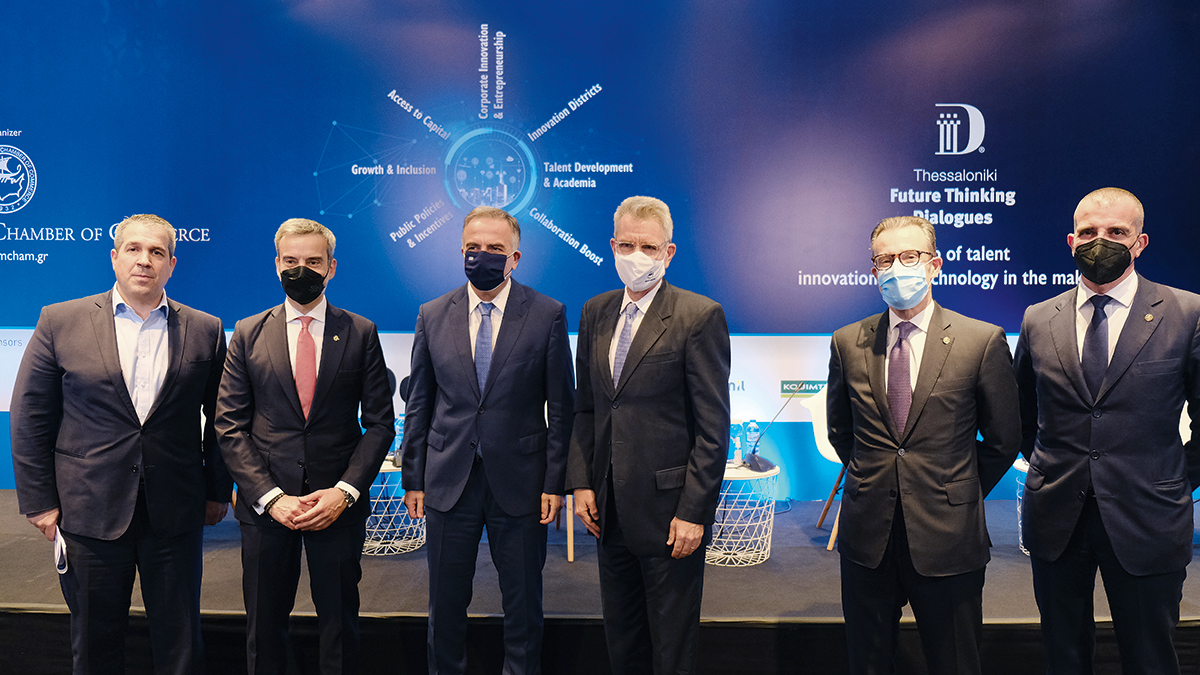Introducing AmChamGR’s newest initiative in Northern Greece
Since it was founded in the late 4th century BCE, Thessaloniki has played a key role as a major hub of trade, commerce, culture, innovation, and power in the region. An important metropolis by the Roman period, it was the second largest and wealthiest city in the early Byzantine Empire, going on to become one of the most important cities in the Ottoman Empire, and, by the 19th century, the foremost trade and commercial center in the Balkans. Today, Thessaloniki continues in its leading role, emerging as the digital hub of southeastern Europe—a center of innovation, knowledge development, entrepreneurship, and scientific excellence.
Focusing on the crucial role of technology and talent in a rapidly changing environment and examining how this fits with the vision of Thessaloniki as an internationally recognized knowledge and innovation hub, The American-Hellenic Chamber of Commerce convened its first Thessaloniki Future Thinking Dialogues (TFTD) conference on June 1-2, 2021. Titled “A Hub of Talent Innovation and Technology in the Making,” the event looked at the dynamic technology and innovation ecosystem that has been developing in Thessaloniki, with an emphasis on the significant boost this has recently received due to the surge in interest and investment primarily from US companies and on how the post-Covid-19 new normal is accelerating digital transformation and ushering in radically new ways of living, working and collaborating.
in∙no∙va∙tion dis∙trict A geographic area where anchor institutions and companies cluster and connect with small firms, startups, business incubators, and accelerators.
Physically compact, transit accessible, and technically wired, they offer mixed-use housing, office and retail.
Bruce Katz and Julie Wagner, “The Rise of Innovation Districts”
Speakers
Cees Admiraal – Business Development Director, High Tech Campus Eindhoven
Matt Bergheiser – President, University City District
Sjors Berns – Senior Manager Financial Advisory, Deloitte Netherlands
Wassili Bertoen – Managing Partner, Deloitte Center for the Edge
Michael Bletsas – Director of Computing, MIT Media Lab
Peter Chresanthakes – Vice-President for Institutional Advancement, Anatolia College
Constantinos Constantinidis – CEO, Pelopac
Alexandros Costopoulos – Secretary General, American Hellenic Chamber of Commerce
Wayne Cuervo – Director of Innovation and General Manager, Cisco Toronto Innovation Centre
Philipp Deutscher – Managing Director, TeamViewer Greece
Christos Dimas – Deputy Minister of Research and Innovation
Tim Gaidis – Principal and Senior Project Designer, HOK
Stas Gayshan – Managing Director, Cambridge Innovation Center
Jeff Hamilton – Senior Vice President, Pfizer Digital
Marina Hatsopoulos – President, Hellenic Innovation Network
Nishita Henry – Principal US Consulting Chief Innovation Officer, Deloitte
Vassilis Kafatos – Vice President, American Hellenic Chamber of Commerce
Stavros Kalafatis – Deputy Minister of Interior (Sector of Macedonia-Thrace)
Sophia Kambanis – President and Executive Director, Massachusetts Innovation Network
Panagiotis Karampinis – Managing Director, Endeavor Greece
Athanasios Kouimtzis – BoD member and Chair of the Agrotechnology Committee, American-Hellenic Chamber of Commerce
Konstantinos Lafkas – Co-founder and Partner, Uni.Fund
Elizabeth K. Lee – Consul General, US Consulate General in Thessaloniki
Beth Letscher – Vice President Communication and Strategic Planning, Cortex Innovation Community
Kyriakos Loufakis – President, Thessaloniki Innovation Zone
Andreas Loutzidis – Co-founder, iCry2Talk
Costas Malamas – Co-founder and Managing Partner, Veltio Greece
Jamie Merisotis – President and CEO, Lumina Foundation
Maria Michalopoulou – Vice Rector of Research and Lifelong Learning, Democritus University of Thrace
Litsa Panayotopoulos – Treasurer and Chair, EIE Committee, American-Hellenic Chamber of Commerce
Nikolaos Papaioannou – Rector, Aristotle University of Thessaloniki
Geoffrey R. Pyatt – Ambassador of the United States to the Hellenic Republic
Merin Rajadurai – Adviser to the Secretary Office of Science and Technology, US Department of State
Stella Ronner-Grubačić – Ambassador of the Netherlands to the Hellenic Republic
Athanasios Savvakis – President, Federation of Industries of Greece
Margaritis Schinas – Vice President, European Commission
Alexandros Siskos – Vice President of Strategic Growth Initiatives, Everseen
Steven Strauss – Lecturer and John L. Weinberg/Goldman Sachs & Co. Visiting Professor, Princeton University
Evangelos Syrigos – Deputy Minister of Education and Religious Affairs
Anastasios Tzikas – President, TIF-Helexpo and Technopolis ICT Business Park
Apostolos Tzitzikostas – Governor, Region of Central Macedonia
Dimitris Tzovaras – President, Centre for Research and Technology Hellas
Marco Veremis – Partner, BigPi Venture Capital
Panos Vlachos – President, Anatolia College
Julie Wagner – President, The Global Institute of Innovation Districts
Konstantinos Zervas – Mayor, Municipality of Thessaloniki
Grand Sponsor: Deloitte
Sponsors: Cisco, Pfizer
Supporters: Alumil, Kouimtzis Group, Logismos Information Systems, Margaropoulos & Associates
Media Partner: Athens-Macedonian News Agency
For more information on TFTD, this year’s agenda and the speakers,
visit www.amcham.gr/events/event/thessaloniki-future-thinking-dialogues/

On the occasion of AmChamGR’s first TFTD, Business Partners asked the event’s sponsors to share their thoughts and experiences on global business and innovation districts, TFTD and Thessaloniki’s promising future.

Thessaloniki’s Evolving Talent and Innovation Ecosystem
By Vassilis Kafatos, Deloitte Partner – DACC Chairman, AMCHAM Vice-President
In the last couple of decades, and as new technologies blur boundaries and geographical distinctions, knowledge and innovation are becoming more decentralized. We are witnessing more and more cities around the world embarking on concentrated efforts to cultivate, attract and retain talent and advance innovation as a driver of inclusive economic growth. Moreover, numerous urban innovation districts are being developed, as it is widely recognized that innovation and economic growth require collaboration, communication, openness, networking, and idea exchange. Within that context, Thessaloniki has the unique opportunity to capitalize on its strengths and the latest wave of investments in competence and digital centers and develop into a talent and innovation hub of global reach.
Innovation and economic growth require collaboration, communication, openness, networking and idea exchange
At the beginning of 2018, Deloitte founded in Thessaloniki the Deloitte Alexander Competence Center (DACC), a pan-European center of expertise, training and innovation, aiming to harness the abundant talent of the city, create new jobs and reverse the brain drain. Although at the time uncertainty in Greece was high, Deloitte invested in the prospects and advantages of the city; the quality of the academic institutions and research centers, the strong talent pool and the good quality of life in a city becoming more extroverted and open to new ideas and concepts. DACC focuses on the development of skills and knowledge of young university graduates or professionals seeking a different career path through reskilling and upskilling. Following continuous training in exponential technologies and innovative services and solutions, DACC professionals work from Thessaloniki on challenging and rewarding projects of the Deloitte global network.
During an era when talent is the rarest and most valuable asset for businesses and consequently for cities and countries, such investments can contribute to creating a virtue circle of growth by attracting other impactful initiatives. The American-Hellenic Chamber of Commerce recognized this growth momentum and organized the first Thessaloniki Future Thinking Dialogues on how the city can transform into a talent, innovation and technology hub of international caliber. A vision of a model city achieving sustainable and inclusive growth driven by innovation; harmoniously hosting large corporates and startups, top academic institutions and research centers; exhibiting a vibrant and contemporary urban environment, an inclusive and diverse culture and an improved quality of life; growing and attracting top talent; providing ample personal and professional opportunities.
The event hosted highly engaging dialogues with global thinkers and leaders of the innovation ecosystem, around disruptive trends and the future of work, the role of education and reskilling, the importance of talent and collaboration for driving innovation, the way vibrant and livable innovation districts are becoming drivers of inclusive economic growth and prosperity. More importantly, it provided valuable and practical insights on how Thessaloniki can develop into a prominent hub of talent, innovation and technology and achieve a brighter future for the city and its people.

Global Business and Innovation Districts
By Wayne Cuervo, Director of Innovation and General Manager, Cisco Toronto Innovation Centre
The Emerging Technologies and Incubation (ETI) Group has the charter to establish and advance the next Big Bets for Cisco. Solve the hard, large problems in a fundamentally novel, agile, ambitious, and entrepreneurial manner. Within the Cisco Innovation Labs at Cisco, we believe that ideas can come from anywhere. These ideas are often from customer discussions on their problems; engagement with the VC and startup communities on challenges they are facing; and especially from our employees. These ideas often need a closer look and need to be supported through our innovation pipeline. To take these ideas from incubation to scale, we are doing deep business and market analysis and pushing the limits on technology and assessing the feasibility of that technology readiness. As we explore these ideas, we go through key stages of sourcing, validating, and scoping these ideas. This is inclusive of extensive market research, customer identification, business and technical feasibility, and percentage of confidence in proof of concept.
Ideas can come from anywhere
We also drive local engagement with our key strategic customers, local government agencies and other groups. Some of these projects include Deleting Loneliness, a project in Barcelona addressing the challenges of a rise in aging populations with impaired mobility and connecting seniors to one another and to other programs via video based on topics of interest, and Digital Canopy, a project to provide internet access for low-income communities in Toronto, scaled to 13,000 residents without internet access at home in partnership with the City of Toronto.

New Technologies Support the Patient Journey: From Diagnosis to Treatment
By Nico Gariboldi, Senior Director, Site Lead of Center for Digital Innovation, Pfizer
The rapid development of new technologies in recent years has drastically changed what we call the patient journey. Digital capabilities are now key to supporting patients along their path from diagnosis to monitoring and then to treatment.
Diagnosis It is impossible for our doctor to check symptoms on a 24-hour basis and decide if a clinical follow-up is needed. AI can support decisionmaking by translating symptoms and suggesting next steps, focusing on prevention and fostering personalized care.
Monitoring Virtual coaches communicate with patients, answer questions about their treatment and provide alerts, reminders and support independent living. At the same time, data analytics enable the detection of disease patterns and behavioral symptoms and provide a holistic view of the patient status, always respecting the relevant legislation about data privacy and personal data.
Treatment As per treatment, AI supports the advent of precision medicine, which uses novel technologies to better understand the biological basis of the disease, thus allowing the development of innovative therapies.
Ultimately, AI and new technologies are evolving into an extremely useful tool with significant benefits for all parties involved, provided they are properly and ethically managed.
In the Center for Digital Innovation (CDI) at Pfizer in Thessaloniki, we are on a mission to leverage AI to make clinical drug development and delivery faster and smarter. Guided by Pfizer’s Purpose—breakthroughs that change patients’ lives and always in compliance with legislation regulating artificial intelligence and data protection—CDI will aim to digitize drug discovery and development and enhance health outcomes and patient experience.


